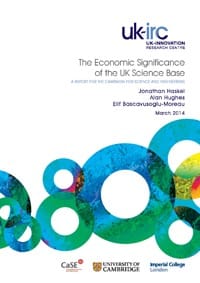
The new report provides compelling evidence that public investment in scientific research leads to:
- economic growth through an increase in private sector productivity
- beneficial economic and societal impacts through increased interaction between the academic and private sectors
It adds crucial evidence to support advice that government can drive economic growth by investing in science and engineering research.
Director of CaSE, Dr Sarah Main, said: “This new economic analysis shows us how the UK’s exceptional science and engineering sector can be the corner stone of our economy. The UK has a world-class reputation for scientific research, which innovative industries want to access. Government will reap great rewards by investing in science through university and research funding because it raises our knowledge base and acts as a magnet for private sector investment.”
Report author Professor Alan Hughes, UK~IRC and Cambridge Judge Business School, said: “The report provides clear evidence that academics receiving public sector research funding are also those most likely to engage with the private sector. It also provides compelling evidence that public and private sector research expenditures are complementary. They should not be seen as substitutes in the drive to enhance the productivity performance of the UK.”
Report author Professor Jonathan Haskel, UK~IRC and Imperial College Business School, said: “The UK research and science base should be regarded as a vital part of British infrastructure, delivering strong economic returns and helping economic growth.”
In the light of this new evidence, CaSE calls for current and future governments to recognise that public spending on science and engineering is an investment with significant benefits for the economy and society.
The report was produced by the UK Innovation Research Centre (UK~IRC), a joint venture between the Centre for Business Research at the University of Cambridge and Imperial College Business School to further research and knowledge exchange on innovation policy practice. The Centre is co-funded by the Department for Business, Innovation and Skills (BIS), the Economic and Social Research Council (ESRC), the National Endowment for Science, Technology and the Arts (NESTA and the Technology Strategy Board (TSB).


